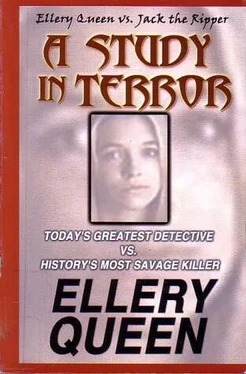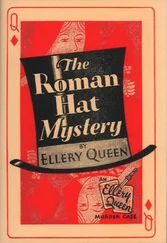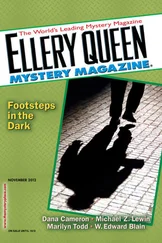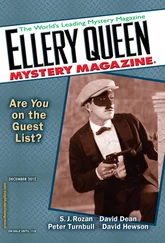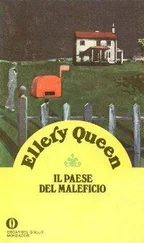“Sherlock,” said Mycroft, “I have not been in this room since your last visit, but the faces outside never change. From the look of that street, it could have been yesterday.”
“Yet,” murmured Sherlock, “it has changed.
Old intrigues have died, new ones have been born.”
Mycroft pointed. “Those two fellows at the kerb. Are they involved in some dire plot?”
“Do you mean the lamp-lighter and the book-keeper?”
“The very men.”
“I’d say not. The lamp-lighter is consoling the book-keeper for being recently sacked.”
“I agree. The book-keeper will no doubt find a berth, but he will lose it speedily and find himself again on the street.”
I was compelled to interrupt. “Come, come,” said I, and heard myself repeating my old objections. “This is too much!”
“Watson, Watson,” chided Mycroft, “after all those years with Sherlock, I should not expect such myopia from you. Even from this distance, surely you observe the smears of ink, both black and red, upon the first man’s fingers? Just as surely, the occupational mark of the bookkeeper?”
“Observe also,” added Holmes the younger, “the ink-blot upon his collar, where he touched pen to linen, and the unpressed condition of his otherwise quite respectable suit.”
“From which is it too difficult, my dear Watson,” interposed Mycroft, with a kindliness that irritated me, “to project the man’s slovenliness to his work, and thus conjure up an irate employer?”
“An employer not only irate but unforgiving,” said Sherlock, “as evidenced by the newspaper in the book-keeper’s jacket-pocket, opened to the Situations column. Hence, he is unemployed.”
“But you said he would find a berth!” said I, testily, to Mycroft. “If the fellow is so inefficient, why should a new employer consider him?”
“Most would not, but many of the entries in the newspaper are marked, clearly for investigation. Such energy in seeking a new situation must eventually be rewarded.”
I threw up my hands. “I concede, as usual! But the other man’s being a lamp-lighter―surely that is sheer surmise on your part?”
“A little more technical,” my friend Holmes admitted. “But observe the spot that is worn shiny on his inner right sleeve, extending upwards above the cuff.”
“An unfailing mark of the lamp-lighter,” said Mycroft.
“In extending his pole to reach the gas-globe with his flame,” explained Sherlock, “he rubs the lower end of the pole against that portion of his sleeve again and again. Really elementary, Watson.”
Before I could retort, Holmes’s mood changed, and he turned from the window with a frown. “I wish our present problem were as easily solved. That is why we are here, Mycroft.”
“Give me the details,” replied his brother, with a smile. “My afternoon must not be entirely lost.”
Twenty minutes later, ensconced in easy-chairs in the Stranger’s Room, we sat in silence. It was broken by Mycroft. “Your picture is well-delineated, Sherlock, so far as it goes. But surely you are capable of solving the riddle yourself.”
“I have no doubt of that, but there is little time. Preventing further outrages is urgent. Two minds are better than one. You might well discern a point that would save me a precious day or two of searching.”
“Then let us see precisely what you have. Or, rather, precisely what you do not have. Your pieces are far from complete.”
“Of course.”
“Yet you have touched a sensitive spot somewhere, as witness the swift and murderous attack upon you and Watson. Unless you wish to ascribe it to coincidence?”
“I do not!”
“Nor I.” Mycroft tugged at an ear. “Of course, it is no cerebral feat to identify the mysterious Pierre by his true name.”
“Certainly not,” replied Holmes. “He is the Duke of Shires’s second son, Michael.”
“As to Michael’s grievous injuries, the father may be unaware of them. But Lord Carfax certainly knows of Michael’s presence at the hostel, and beyond doubt recognised his younger brother.”
“I am quite aware,” said Holmes, “that Lord Carfax has not been entirely candid.”
“He interests me. The philanthropic cloak is an admirable disguise for devilry. Lord Carfax could well have been responsible for Michael’s delivery into Dr. Murray’s care.”
“Also,” said Holmes, grimly, “for his inju-nes.
“Possibly. But you must find the other pieces, Sherlock.”
“Time, Mycroft, time! That is my problem. I must identify, quickly, the right thread in this skein, and seize upon it.”
“I think you must somehow force Carfax’s hand.”
I broke in. “May I ask a question?”
“By all means, Watson. We had no intention of excluding you.”
“I can be of little help, but certainly identifying Jack the Ripper is our first concern. Therefore I ask, do you believe we have met the murderer? Is the Rippef one of the people with whom we have come in contact?”
Sherlock Holmes smiled. “Do you have a candidate for that dubious honour, Watson?”
“If I were compelled to make a selection, I should name the imbecile. But I must confess that I missed badly in not postulating him as Michael Osbourne.”
“On which grounds do you condemn him?”
“Nothing tangible, I fear. But I cannot forget the tableau I witnessed as we were leaving the Montague Street morgue. Dr. Murray, you will recall, commanded ‘Pierre’ to cover the unfortunate’s corpse. There was nothing conclusive in his action, but his manner made my flesh fairly crawl. He seemed entranced by the mutilated cadaver. In smoothing out the sheet, his hands ran lovingly over the cold flesh. He appeared to be enamoured of the butchery.”
There was a pause during which the brothers evaluated my contribution. Then Mycroft said, gravely, “You have made a most pertinent point, Watson. I would only say that it is difficult, as you are aware, to interpret the actions generated by a damaged mentality. However, your instinctive revulsion may be worth more than all the logic we can muster.”
“The observation is certainly to be considered,” remarked Sherlock.
I gathered the impression, however, that neither put any great stock in my statement; that they were merely being kind.
Mycroft came ponderously to his feet. “You must gather more facts, Sherlock.”
His brother clenched his hands.
It had occurred to me that this entire episode with Mycroft was not at all like the sure-footed, self-confident Sherlock Holmes I had known. I was puzzling the matter when Mycroft, speaking quietly, said, “I believe I know the source of your confusion, Sherlock. You must banish it. You have become subjective in regard to this case.”
“I fail to comprehend,” Holmes said, a trifle coldly.
“Five of the most heinous murders of the century, and perhaps more to come. If you had entered the case sooner, you might have prevented some of these. That is what gnaws at you. The acid of guilt can dull the keenest intellect.”
Holmes had no rebuttal. He shook his head impatiently, and said, “Come, Watson, the game is afoot. We stalk a savage beast.”
“And a cunning one,” said Mycroft, in clear warning. Then he said, “Sherlock, you seek a scar-faced woman. Also, one of the key-pieces that is missing, the ill-reputed wife of Michael Osbourne. What does that suggest?”
Holmes fixed his brother with an angry eye. “You must indeed feel that I have lost my faculties, Mycroft! It of course suggests that they are one and the same.”
On that note, we left the Diogenes Club.
Ellery’s Nemesis Investigates
The apartment bell was a carved rosebud set in ivory leaves. Grant Ames jabbed it, and the result was a girl wearing poisonous-green lounging pajamas.
Читать дальше
